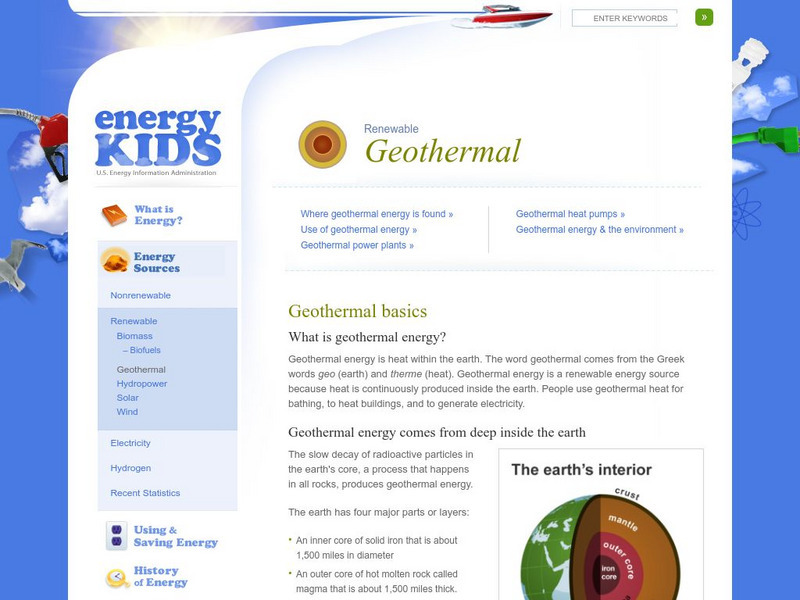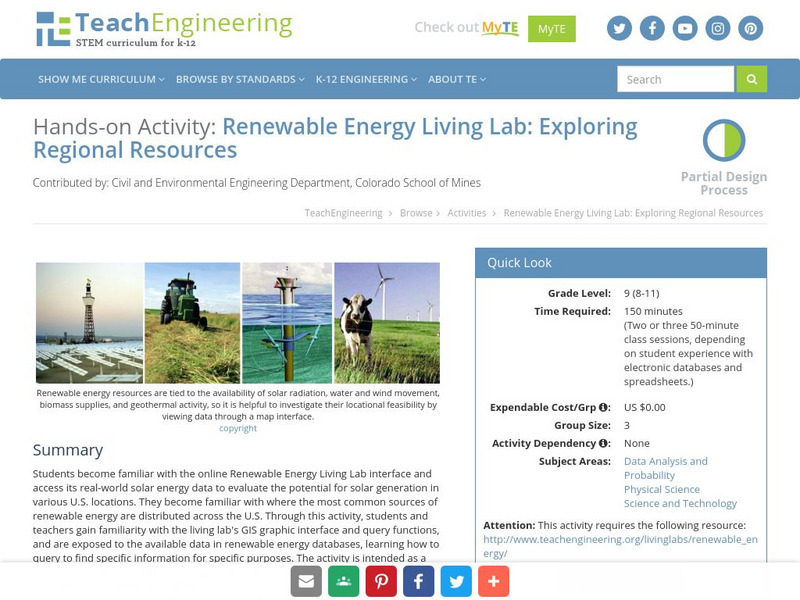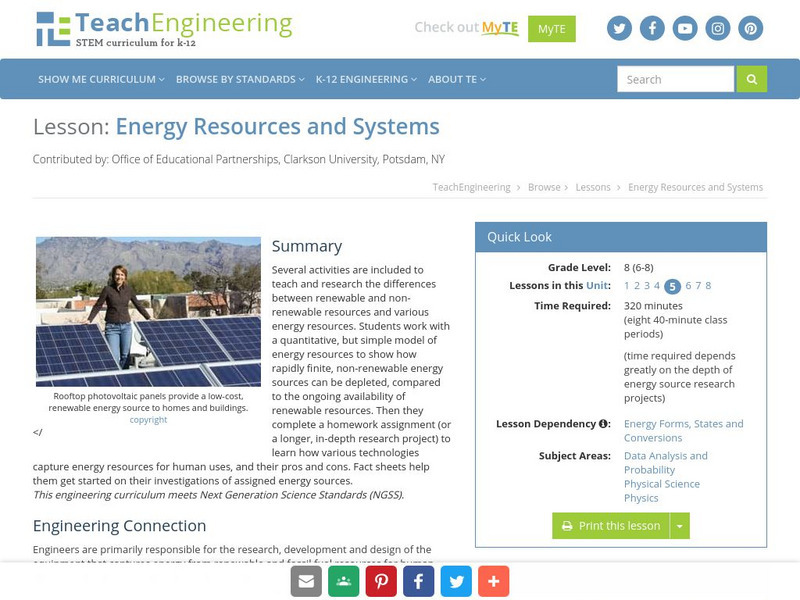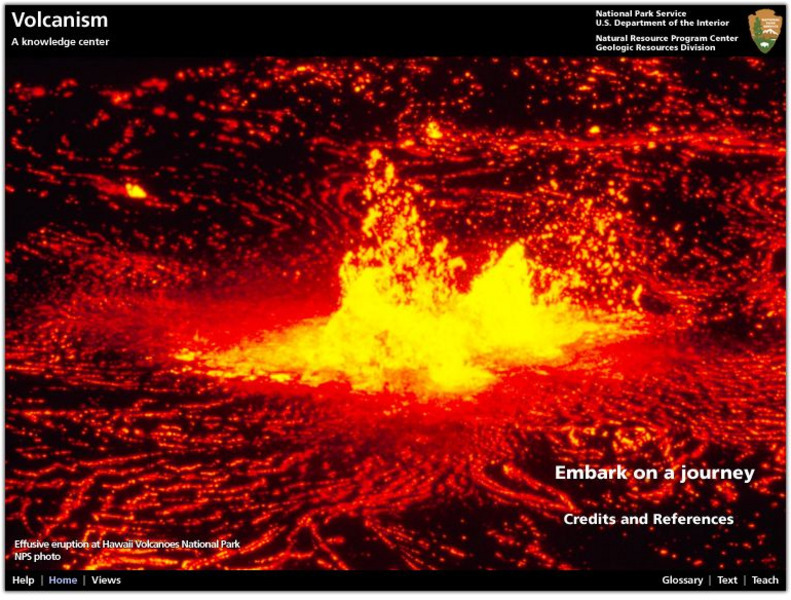Curated OER
Energy Is Everywhere
Students determine the difference between renewable and non-renewable resources and identify the different forms of energy. They discuss life without energy and where energy comes from before reading an article about the different...
Curated OER
Power Up!
Students explore energy sources. In this science instructional activity, students complete an interactive activity in which they choose the energy sources they will use to power a city. Students discuss renewable energy options.
Curated OER
Groundwater Resources
Students use digital maps to explore underground reservoirs. Individually, or in small groups, students access specified internet sites and research uses and locations of groundwater. Students explore the percentage of usable water,...
Curated OER
INFRARED OLD FAITHFUL
Middle schoolers view video clips and still images of Old Faithful and review the main questions and curiosities regarding Old Faithful. They break into groups and take on the roles of explorers and have come upon this interesting...
Curated OER
Some Like It Hot, Some Like It Cold
Students are explained that thermophiles are organisms that have optimal growth temperatures above 50oC. They investigate the temperature ranges for the growth of common bacteria. Students answer the question of do either of these...
Columbus City Schools
It’s Electric!
Shocking! Who knew so many great ideas existed for teaching middle schoolers about electricity? Find them all within this energetic framework. You'll light up at the variety of printable and web-based resources within! After building...
Exploratorium
Geyser
Although it requires a little extra preparation the first time you use this geyser demonstration, it can be used repeatedly once it has been constructed. This demonstration is useful in showcasing how heat leads to increased pressure and...
Curated OER
Residential Power System
Perform data analysis on energy consumption to apply algebraic expressions to the real world. Learners will write and solve equations that answer various questions from residential power use. They will collect data at home and calculate...
Curated OER
Primary Energy Sources Pros and Cons
Students explore the different types of renewable and nonrenewable energy sources. In this earth science lesson, students discuss the pros and cons of each type. They conduct a variety of experiments on renewable energy.
Curated OER
Energizing Resources
Seventh graders describe electrical energy and how it is produced. In this natural resource activity, 7th graders explain the various ways of obtaining and using natural resources for energy and the environmental consequences. They will...
Curated OER
Tucson Children's Museum Electricity Crossword
In this Tucson Children's Museum Electricity worksheet, students review and discuss twenty key terms associated with electricity and complete a crossword puzzle with those key terms.
Curated OER
Tucson Children's Museum Electricity Word Search
In this Tucson Children's Museum Electricity worksheet, students review and discuss twenty key terms associated with electricity and circle each key term in a word search puzzle.
Curated OER
Volcanoes:How Safe Are They?
Learners explore volcanoes, locate them on maps, record general information about volcanoes, and organize information on a fact sheet.
Curated OER
Energy Source Web Quest
Students research an energy source and create a Power Point presentation to share with the class. In this energy sources lesson, students are assigned an energy source to research. They use the Internet to research the source and create...
Curated OER
What's in the Water?
Middle schoolers examine water data for up to a month and perform tests on the samples.
Curated OER
How Much Electricity Do You Use Each Year
Students relate the usage of common household appliances to coal usage. They examine the example of how much coal is used each year by a typical family of four to operate various appliances.
Curated OER
Energy: The Big Picture
Students research about energy related topics. In this earth science lesson plan, students discuss ways to save energy. They create a presentation about their research and share it with the class.
US Energy Information Administration
U.s. Eia Energy Kids: Renewable Geothermal Energy Energy From the Earth's Core
Did you know that the earth produces incredible amounts of heat or geothermal energy? This heat can escape in dramatic volcano eruptions, but it can also escape as steam through geysers and other sources. Learn how this heat can be...
TeachEngineering
Teach Engineering: Renewable Energy Living Lab
Students become familiar with the online Renewable Energy Living Lab interface and access its real-world solar energy data to evaluate the potential for solar generation in various U.S. locations. They become familiar with where the most...
Other
California Energy Commission: Science Projects
A number of electrical, nuclear, solar, and wind science projects and energy activities are described on this page, with links to each activity.
Other
Lehigh University: Energy
An inquiry-based science unit for middle school learners centered on the world's energy sources. The lessons integrate technology and lab activities while teaching about energy sources, production, and consumption.
TeachEngineering
Teach Engineering: Energy Resources and Systems
Several activities are included to teach and research the differences between renewable and non-renewable resources and various energy resources. Students work with a quantitative, but simple model of energy resources to show how rapidly...
Curated OER
National Park Service: Explore Nature: Views: Volcanism: Embark on a Journey
A journey into the depths of a volcano teaches students about volcanic rocks, eruptions, features, and locations. Also find out how volcanologists monitor activity and conduct scientific research on eruptions.
Science Education Resource Center at Carleton College
Serc: Alternative Energy Debate
With a learning team, young scholars choose an alternative energy source such as solar, wind, biofuel, geothermal or other form and research the pros and cons of that energy type. The team then splits into debate teams and draws straws...























